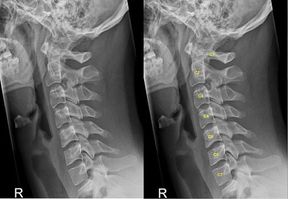THINK TWICE!
 Image by Lucien Monfils
Image by Lucien Monfils After two years, just one fourth of those who had surgery had actually returned to work. That’s compared to 67 percent of patients who didn’t have surgery being able to return to work ------- even though everyone from both groups had the exact same diagnoses! In another troubling finding, the same researchers determined that in the Spinal Surgery group there was a 41 percent increase in the use of prescription painkillers, particularly addictive and dangerous opiates (narcotics). If you follow my blog, you are already aware that Hydrocodone is the #1 prescription drug in America, and that deaths from addictive painkillers have doubled in the last 10 years (HERE).
What does this Worker's Comp Study on Back Problems tell us? Something that many in the medical community (particularly the medical research community) have known for over three decades. “The study provides clear evidence that for many patients, fusion surgeries designed to alleviate pain from degenerating discs don’t work”. This quote was by the study’s lead author, Dr. Trang Nguyen, a researcher at the University of Cincinnati College of Medicine.
The October 14, 2010 of the Daily Hit described what some of the people in similar situations are going through. Just a month after back surgery, Nancy Scatena was again in excruciating pain. The medications her doctor prescribed barely took the edge off the unrelenting back aches and searing jolts down her left leg. “The pain just kept intensifying,” stated the 52-year-old Scottsdale, Ariz., woman who suffers from SPINAL STENOSIS, a narrowing of the channel through which spinal nerves pass. “I was suicidal.” Finally, Scatena made an appointment with another surgeon, one whom she had heard called a “miracle worker.” The new doctor assured her that this second operation would fix everything, and in the pain-free weeks following an operation to fuse two of her vertebrae it seemed that he was right. But then the pain came roaring back. Is Nanci's case an aberration, or is it closer to the norm. Unfortunately, it's ridiculously common!
SUCCESS RATES OF SPINAL SURGERY
It is interesting to note the numbers thrown around on the internet concerning the success rates of back surgery. Although study after study shows that the success rates for major spinal surgeries are in the toilet, the internet is crammed full of page after page after page of websites touting its effectiveness (usually in the 75-85% range). Virtually all of these sites just happen to be owned by Orthopedists and Neurosurgeons. But is there really that big of a financial incentive to perform unnecessary back surgeries? Never forget that "Money Talks"! By all accounts, doctors who are doing back surgery are, as a group, some of the most well-compensated doctors in the country.
Dr. Charles Rosen of University of California, Irvine has called for the resignation of leaders of the North American Spine Society (NASS) because of corruption and blatant financial conflicts of interest. He showed that some of these industry leaders receive, "hundreds of thousands – even millions of dollars in incentives from companies that manufacture spinal devices". Continuing Education courses put on by the NASS are attended by thousands upon thousands of spine surgeons every year, with many being nothing more than glorified advertisements for various drugs and medical devices. This is not anything new ---- USA Today ran a story on this sort of thing earlier this year.
The fact that we cannot trust the individuals who sell us drugs and medical advices is not any sort of new revelation. Not only did I run a couple of recent Blog Posts on the multi-billion dollar fines that were recently paid by both Pfizer and GlaxoSmithKline (HERE), but I also wrote a post showing how even the medical guidelines and standards of care have been hijacked by leaders of the medical profession, and severely tainted by financial conflicts (HERE). You don't say!
Renowned neurosurgeon Arron Filler, MD, Ph.D recently had this to say on this matter of being able to trust medical guidelines concerning the guidelines for implants and instruments used in spinal surgeries ---- guidelines that the public is totally unaware are nothing more than advertisements for their products because they have been bought and paid for by the highest bidders.
"Formal scientific publications on a new type of spinal device had revealed extraordinarily high success rates and explicitly reported “zero” device-related complications. However, a separate study in the very same medical journal involving only surgeons with no financial interest revealed an unusually high rate of “device related” complications and failures (HERE)... The occurrence of unusual new types of complications and the need for re-operations were often due to the device implants. Patients could be harmed by the device with no prospect of benefit. Differences in reported scientific results seemed to reflect the difference between conflicted versus non-conflicted investigators.
Many surgeons receive manufacturer funds to attend training meetings in places like Vail, Cancun and Las Vegas, advertised as academic medical education events. I recently organized a session at one such meeting that brought in several nationally respected neurosurgeons to teach new diagnostic techniques and treatments to reduce the use of implants. Meeting sponsors from the device industry objected and the session was cancelled. How is this sort of training bias disclosed to the patients of those doctors?
What does Dr Filler suggest in response to what is going on in his profession? Something that is so impractical and difficult as to be nearly impossible to get doctors to comply with.
This means that any time a spinal surgeon recommends a surgery that involves an implant, the patient should obtain a disclosure from the surgeon revealing financial interests (investment, “research funding,” free travel or industry sponsored conferences, paid consulting arrangements, paid dinners, or other financial benefits outside of the surgical fees).
Are you angry yet? If you are one of those who has had back surgery or is thinking about a back surgery, you should be downright p_ _ _ _ d! Experts estimate that well over half a million Americans opt for back operations each year. But for many, research has shown that spinal surgeries frequently backfire, leaving them in more pain than they were before. Don't believe me? Look around you. Talk to 10 people who have already had back surgery and see what they have to say about the matter. Sure, there are people that are helped by back surgery. It's not the norm! Particularly with invasive "fusion" type surgeries.
Nearly 30 Million American Adults Suffer With Back Problems
The governmental organization, Agency for Healthcare Research and Quality, found that in 2007, twenty-seven million adults reported back problems. They (or their insurance companies ---- often times the American tax payer via Medicare & Medicaid) spent a whopping $30.3 billion on treatments to help with the pain. While some of that money is spent on physical therapy, chiropractor visits, and other non invasive forms of treatment, a big chunk pays for spinal surgeries ---- surgeries that simply don't work.
We learned two years ago that a popular spinal surgery for degeneration and compressions (Vertebroplasty ---- injecting "cement" into bad vertebrate) was proven to be NO BETTER THAN PLACEBO. This certainly has not slowed this procedure down any! And it is considered to be a "non-invasive" spinal surgery. But what about the more invasive spinal surgeries?
As I reported HERE, complicated spine surgeries that involve fusing vertebrae together are increasing dramatically --- particularly in the geriatric population. In just 15 years, there was an eight-fold increase in this type of operation, according to a study published in the journal Spine in July of 2009. Although you would not know it from talking with your local doctor, this news has many medical researchers and public health experts alarmed. So what's a person suffering with back problems to do!
Let me simply say that for those of you suffering with severe and chronic back problems, don't even think about a starting point that includes spinal surgery. Look into the increasingly popular Spinal Decompression Therapy. Spinal Decompression Therapy has been shown by NUMEROUS STUDIES to be both an effective and cost-effective way of managing the pain associated with DEGENERATIVE DISCS as well as SPINAL STENOSIS --- not to mention HERNIATED DISCS, SCIATICA, or FACET SYNDROME.
To learn more about our specific SPINAL DECOMPRESSION PROTOCOL for these and other similar problems, please browse our site Better yet, go HERE to check out our latest testimonial videos on Spinal Decompression Therapy. Call (417) 934-6337 to schedule a free, no-obligation consultation with Dr. Schierling to find out whether you MIGHT BE A GOOD CANDIDATE for Non-Surgical Spinal Decompression.






 RSS Feed
RSS Feed
